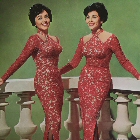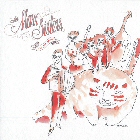To me,you are handsome |
Bay mir bistu sheyn |
בײַ מיר ביסטו שיין | |||||||
| |||||||||
|
|
|||||||||
| I want to tell you, I want right now | Kh'vil dir zogn, dir glaykh tsu hern | כ´וויל דיר זאָגן, דיר גלײַך צו הערן | |||||||
| To hear you explain love to me. | Az du zolst mir libe derklern. | אַז דו זאָלסט מיר ליבע דערקלערן. | |||||||
| When you speak with your eyes, | Ven du redst mit di oygn, | ווען דו רעדסט מיט די אויגן, | |||||||
| I would fly away with you wherever you want. | Volt ikh mit dir gefloygn vu du vilst | וואָלט איך מיט דיר געפֿלויגן וווּ דו ווילסט | |||||||
| I don't care! | S'art mikh nit! | ס´אַרט מיך ניט! | |||||||
| If you were black as a Tatar, | Ven du zolst zayn shvarts vi a Toter, | װען דו זאָלסט זײַן שװאַרץ װי אַ טאָטער, | |||||||
| If you had eyes like a tomcat, | Ven du host oygn vi bay a koter, | װען דו האָסט אױגן װי בײַ אַ קאָטער, | |||||||
| And if you limped a little, | Un ven du hinkest tsubislekh | און װען דו הינקסט צוביסלעך, | |||||||
| If you had crooked legs, | Host krume fislekh, | האָסט קרומע פֿיסלעך, | |||||||
| I say: I don't mind. | Zog ikh: dos art mikh nit. | זאָג איך: דאָס אַרט מיך ניט. | |||||||
| And if you have a silly smile, | Un ven du host a narishn shmaykhl, | און ווען דו האָסט אַ נאַרישן שמײַכל, | |||||||
| And if you have the brain of Vayezatha*, | Un ven du host vayzusyes seykhl, | און ווען דו האָסט ווייַזתאס שׂכל, | |||||||
| If you are wild like an Indian, | Ven du bist vild vi an Indianer, | ווען דו ביסט ווילד ווי אַן אינדיאַנער, | |||||||
| And even like a Galician, | Afile a Galitsyaner, | אַפֿילו אַ גאַליציאַנער, | |||||||
| I say: I don't mind. | Zog ikh: dos art mikh nit. | זאָג איך: דאָס אַרט מיך ניט. | |||||||
| Tell me, how do you explain that? | Zog mir vi derklerstu dos? | זאָג מיר ווי דערקלערסטו דאָס? | |||||||
| I'll tell you right away why: | Kh׳vel dir zogn bald far vos: | כ'וועל דיר זאָגן באַלד פֿאַר וואָס: | |||||||
| To me you are handsome, | Bay mir bistu sheyn, | בײַ מיר ביסטו שיין, | |||||||
| To me you have charm, | Bay mir hostu kheyn, | בײַ מיר האָסטו חן, | |||||||
| To me you are unique in the world. | Bay mir bistu eyner oyf der velt. | בײַ מיר ביסטו איינער אויף דער וועלט. | |||||||
| To me you are good, | Bay mir bistu git, | בײַ מיר ביסטו גיט, | |||||||
| To me you have "it”, | Bay mir hostu "it", | בײַ מיר האָסטו "איט”, | |||||||
| To me you are more precious than money. | Bay mir bistu tayerer fun gelt. | בײַ מיר ביסטו טייַערער פֿון געלט. | |||||||
| Many young men have already | Fil sheyne yingelekh hobn shoyn | פֿיל שײנע ייִנגעלעך האָבן שױן | |||||||
| Wanted to take me, | Gevolt nemen mikh, | געוואָלט נעמען מיך, | |||||||
| And among them all, | Un fun zey ale oysgeklibn | און פֿון זיי אַלע אויסגעקליבן | |||||||
| I chose only you. | Hob ikh nor dikh. | האָב איך נאָר דיך. | |||||||
| To me you are handsome, | Bay mir bistu sheyn, | בײַ מיר ביסטו שיין, | |||||||
| To me you are charming, | Bay mir hostu kheyn, | בײַ מיר האָסטו חן, | |||||||
| To me you are unique in the world. | Bay mir bistu eyner oyf der velt. | בײַ מיר ביסטו איינער אויף דער וועלט. | |||||||
* Vayezatha: The name of this biblical character appears in the Book of Esther (9.9)
Esther was chosen by the Persian king Ahasuerus, who took her as his wife (one of his wives). Out of fear, she hid her Jewish heritage. Her adoptive father Mordecai tried to protect her from afar. This drew the hatred of the vizier Haman, who decided to exterminate the entire Jewish people and obtained a royal decree to that effect. On a specific date, several months later, all the Israelites in the Empire were to be killed, and this royal decree was to be posted everywhere. Queen Esther dared to defy the prohibitions of royal etiquette and obtained mercy for her people. Ahasuerus had Haman executed and, unable to revoke his first decree, issued a second one in which he gave the Jewish people the right to defend themselves on the appointed day and to kill those who wanted to exterminate them. This decision, too, had to be posted throughout the kingdom.
The text recounts that Haman's sons remained there waiting, without seeking shelter. Vayezatha being the last, he could theoretically have tried to save himself, to hide, but instead he remained waiting for death.
Everything related to Haman in the Yiddish language carries a strong negative, derogatory connotation. In the case of this latter character, his name has become a common noun and is therefore synonymous with immeasurable stupidity.
Esther was chosen by the Persian king Ahasuerus, who took her as his wife (one of his wives). Out of fear, she hid her Jewish heritage. Her adoptive father Mordecai tried to protect her from afar. This drew the hatred of the vizier Haman, who decided to exterminate the entire Jewish people and obtained a royal decree to that effect. On a specific date, several months later, all the Israelites in the Empire were to be killed, and this royal decree was to be posted everywhere. Queen Esther dared to defy the prohibitions of royal etiquette and obtained mercy for her people. Ahasuerus had Haman executed and, unable to revoke his first decree, issued a second one in which he gave the Jewish people the right to defend themselves on the appointed day and to kill those who wanted to exterminate them. This decision, too, had to be posted throughout the kingdom.
The text recounts that Haman's sons remained there waiting, without seeking shelter. Vayezatha being the last, he could theoretically have tried to save himself, to hide, but instead he remained waiting for death.
Everything related to Haman in the Yiddish language carries a strong negative, derogatory connotation. In the case of this latter character, his name has become a common noun and is therefore synonymous with immeasurable stupidity.
From the musical "Men ken lebn nor men lost nit" (1932).


